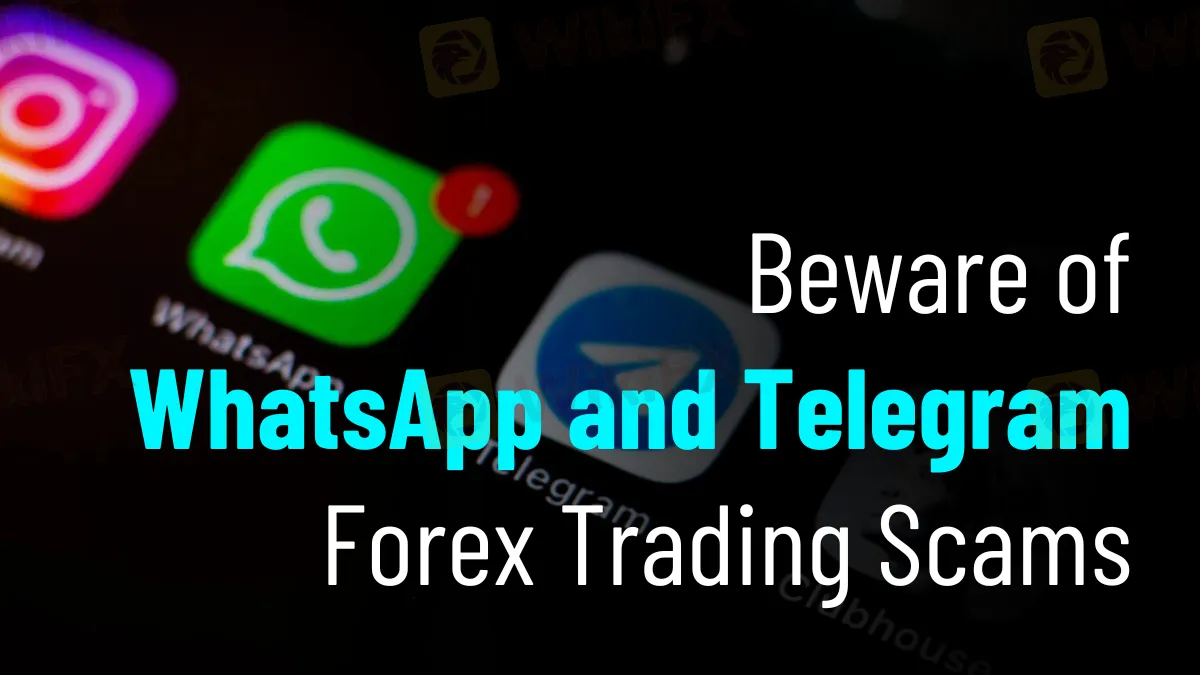简体中文
繁體中文
English
Pусский
日本語
ภาษาไทย
Tiếng Việt
Bahasa Indonesia
Español
हिन्दी
Filippiiniläinen
Français
Deutsch
Português
Türkçe
한국어
العربية
Beware of WhatsApp and Telegram Forex Trading Scams
Abstract:Beware of WhatsApp and Telegram forex trading scams promising quick riches with false signals and high returns. Learn how to spot and report these scams effectively.

Forex trading scams are becoming more common on messaging networks such as WhatsApp and Telegram. Scammers take advantage of people's lack of knowledge and curiosity in forex trading by offering apparently genuine advice and support. To entice victims into their traps, these frauds sometimes use elaborate accounts of personal triumph and promises of large financial advantages.
How Do These Scams Work?
Scammers usually target those who are new to forex trading and want more information or experience. They portray themselves as accomplished traders who live a lavish lifestyle sponsored by their trading winnings. These fraudsters tell tales of rags to riches, claiming to have been poor until discovering an easy method to earn money via forex trading. They now claim to live an opulent lifestyle, touring the globe, driving luxury automobiles, and living in lavish residences.
The promise of unachievable outcomes is a major warning flag in many frauds. Scammers promise prospective victims that forex trading will allow them to become rich rapidly. They promise to produce high, regular profits and offer to trade on the victims' behalf using their funds. When victims seek to withdraw their cash or cease trading, fraudsters often demand additional money or create barriers, forcing them to continue following their advice or buying their forex trading goods and services.
WhatsApp's Impact on Forex Trading Scams
Because of its secure communication capabilities, WhatsApp has become a favourite medium for fraudsters. It enables them to form small groups in which they may connect with victims in an intimate and exclusive atmosphere. Scammers often approach WhatsApp users or discover them on other social media platforms and invite them to join a Forex WhatsApp group or private discussion. WhatsApp's exclusivity and direct connection make it a tempting tool for fraudsters to abuse.
Forex Signals Scams
Forex scams on WhatsApp and other platforms may take many different forms, one of which is the selling of bogus forex signals. Selling genuine forex signals is a frequent activity among traders. These signals shed light on market activity, allowing traders to make more educated purchasing and selling choices. Scammers, on the other hand, take advantage of this technique by selling bogus signals for a monthly subscription, mostly targeting beginner traders.
Genuine technical indicators are not failsafe, especially when employed by expert traders. Market volatility may provide erroneous signals, sometimes resulting in losses. To avoid this risk, experienced traders use a mix of technical and fundamental research. New traders, on the other hand, may fall victim to scams because they believe in the trustworthiness of a single signal propagated by fraudsters. This erroneous confidence might result in enormous financial losses while criminals benefit.
Scammers target prospective victims via social networking networks or WhatsApp forex groups. They engage with other forex traders on public networks like Instagram, Twitter, and Reddit before inviting them to an 'exclusive' WhatsApp group. So-called professionals offer advice and tactics in these communities, but they are often for a fee. The gurus market their information goods, claiming to have methods for making rapid money via forex trading. These goods often feature bogus indications, causing traders to lose money while the fraudsters profit.
Sample scam case:


Reporting Scammers on WhatsApp
If you encounter a scammer on WhatsApp, you can take several steps to report them:
- Report Through WhatsApp Website: You can report a scam via the official WhatsApp website. Log in to the WhatsApp page, navigate to the “Contact Us” section, select “WhatsApp Web,” and then “Report Fraud.”
- The WikiFX Platform: Allows you to share your negative experiences with fraudulent forex brokers. You can also contact their support team to report your experience, which will then be shared widely across the web and social media platforms.
- Block and Report Spam: WhatsApp allows you to block a contact and report it as spam. To do this, open a chat with the scammer, tap on their name at the top of the screen, scroll down, and select “block and report spam.”
- File a Complaint with Relevant Authorities: Some websites and services provide mechanisms for filing complaints against scammers. If a scammer is selling fake forex services, contact the support team of the relevant broker or financial regulator.
- Preserve Evidence: Before blocking and reporting a scammer, save screenshots of all suspicious messages or evidence of fraud. This documentation can be useful for further investigations or warning other users.
Common Tactics Used by Scammers
Scammers employ various tactics to lure victims into investing in fraudulent forex schemes:
- Initial Contact and Trust Building: Scammers often send unsolicited messages claiming to be experienced forex traders or representatives of legitimate trading companies. They use fake profiles with attractive pictures, fake names, and fabricated credentials to build trust.
- Investment Promises: They promise exceptionally high returns with little to no risk, often guaranteeing profits. Scammers share fake success stories, screenshots of profits, and testimonials from other supposed investors to build credibility.
- Pressure Tactics: Scammers create a sense of urgency by offering limited-time investment opportunities and pressuring victims to make quick decisions. They consistently follow up with messages to keep the pressure on and build rapport with the victim.
- Phishing and Personal Information: Scammers may ask for personal details under the guise of verifying identity or creating an account. They send links to fake websites designed to steal login credentials or other sensitive information.
- Payment and Fake Platforms: Victims are asked to pay an upfront fee or deposit to start trading. Scammers direct victims to fake or manipulated trading platforms showing fictitious profits to encourage further investment.
- Withdrawal Issues: When victims try to withdraw their supposed profits, they face delays, additional fees, or complete refusal. Scammers may demand more money to cover taxes, processing fees or to unlock the account.
- Disappearing Act: Once scammers have extracted as much money as possible, they often cut off all communication and disappear.
- Recovery Scams: In some cases, the same scammers or new ones pose as recovery agents, promising to help victims get their money back for an additional fee.
Conclusion
Forex trading scams on WhatsApp and Telegram are a growing concern, exploiting the inexperience and trust of new traders. By understanding how these scams work and recognizing the tactics used by scammers, individuals can better protect themselves. It is crucial to remain vigilant, report suspicious activities, and rely on reputable sources for forex trading information and signals.

Disclaimer:
The views in this article only represent the author's personal views, and do not constitute investment advice on this platform. This platform does not guarantee the accuracy, completeness and timeliness of the information in the article, and will not be liable for any loss caused by the use of or reliance on the information in the article.
Read more

President of Liberland Vít Jedlička Confirms Attendance at WikiEXPO Hong Kong 2025
Vít Jedlička, President and Founder of the Free Republic of Liberland, has confirmed his participation in WikiEXPO Hong Kong 2025, one of the most influential Fintech summits in the industry. The event will bring together global leaders, innovators, and policymakers to delve into the future convergence of technology and society.

Could Japan Move Away from Ultra-Low Rates?
Japan's Interest Rate Hike: Is the Era of Ultra-Low Rates Over?

Fed Rate Cut Expectations Lowered
Federal Reserve officials have adjusted their rate cut expectations, now anticipating only one rate cut this year instead of the previously expected two.

Hong Kong Banks and Authorities Collaborate to Freeze Fraudulent Accounts Faster
Hong Kong police, HKMA work with banks to freeze fraud-linked accounts faster, addressing scam issues while protecting the city's financial reputation.
WikiFX Broker
Latest News
Forex Market Outlook: Key Currency Pairs and Trading Strategies for March 24–28, 2025
Singapore Police Crack Down on Scams: $1.9M Seized, 25 Arrested
Gold Prices Swing Near Record Highs
XTB Opens New Dubai Office
The Growing Threat of Fake Emails and Phishing Scams
Africa Cybercrime Bust: Over 300 Arrested in Fraud Crackdown
Hong Kong Banks and Authorities Collaborate to Freeze Fraudulent Accounts Faster
SocialFi and the Forex Market: A New Era for Decentralized Social Trading?
Is Billion Bucks Fx Scam?
BaFin Halts USDe Token Issuance, Citing Serious Compliance Failures
Currency Calculator








